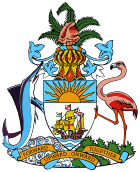
The Bahamas is a parliamentary constitutional monarchy headed by King Charles III in his role as King of the Bahamas. The politics of the Bahamas takes place within a framework of parliamentary democracy, with a Prime Minister as the Head of Government. The Bahamas is an Independent Country and a member of the Commonwealth of Nations. As a former British colony, its political and legal traditions closely follow those of the United Kingdom. King Charles III is the head of state, but executive power is exercised by the cabinet. Legislative power is vested in the two chambers of parliament. The Judiciary is independent of the executive and the legislature and jurisprudence is based on English common law. The multi-party system is dominated by the Progressive Liberal Party and the Free National Movement. The constitution protects freedom of speech, press, worship, movement, and association.
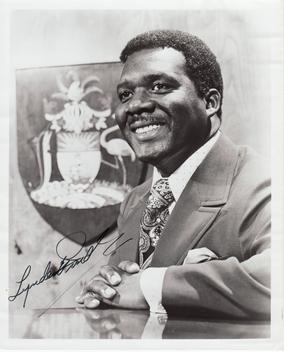
Sir Lynden Oscar Pindling, KCMG, PC, NH, JP was a Bahamian politician who is regarded by some as the "Father of the Nation", having led the Bahamas to majority rule and independence.

Perry Gladstone Christie PC, MP is a Bahamian former politician who served as prime minister of the Bahamas from 2002 to 2007 and from 2012 to 2017. He is the second longest-serving Bahamian elected parliamentarian, representing the Centreville constituency from 1977 to 2017. He is also a former athlete. His Progressive Liberal Party is the oldest Bahamian political party, holding solid majorities in the Bahamian Parliament several times in its long history.
The Free National Movement is a political party in the Bahamas formed in the early 1970s and led by Sir Cecil Wallace-Whitfield. The current leader of the party is Michael Pintard and the current deputy leader is Shanendon Cartwright.

The Progressive Liberal Party is a populist and social liberal party in the Bahamas. Philip Davis is the leader of the party.

Hubert Alexander Ingraham, PC is a Bahamian politician who was Prime Minister of the Bahamas from August 1992 to May 2002, and again from May 2007 to May 2012. He is a member of the Free National Movement Party (FNM). Prior to the 2012 election, he was the FNM's Party Leader and member of Parliament for the North Abaco constituency. He served as leader of the opposition in the House of Assembly of the Bahamas from 2005 to 2007.

Arthur Dion "A. D." Hanna was a Bahamian politician who served as the eighth governor-general of the Bahamas from 2006 to 2010.

General elections were held in the Bahamas on 2 May 2002. The opposition Progressive Liberal Party (PLP) won 29 of the 40 seats in the House of Assembly to defeat the governing Free National Movement (FNM). Voter turnout was 90%.
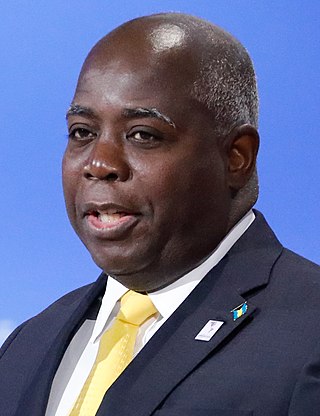
Philip Edward "Brave" Davis is a Bahamian politician serving as the prime minister of the Bahamas since 2021. He was the Member of Parliament (MP) for Cat Island, Rum Cay & San Salvador from 1992 to 1997 and returned to the seat in May 2002, which he still represents.

Frederick Audley Mitchell Jr. is a Bahamian Progressive Liberal Party politician serving as the Minister of Foreign Affairs for the third time. He is the Member of Parliament (MP) for Fox Hill, first elected in 2002 and then again in 2021. He also served two terms in the Senate.

Orville Alton Thompson "Tommy" Turnquest, CBE is a Bahamian politician.
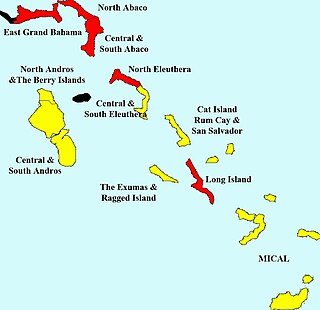
General elections were held in the Bahamas on 7 May 2012. They were the first general election in which a third party offered a full slate of candidates alongside the two major parties, the Free National Movement and the Progressive Liberal Party (PLP). The result was a victory for the opposition PLP, whose leader Perry Christie became prime minister.

Hubert Alexander Minnis, ON is a Bahamian politician and doctor who served as prime minister of the Bahamas from May 2017 to 16 September 2021. Minnis is the former leader of the Free National Movement, the former governing party, and the Member of Parliament for the New Providence constituency of Killarney. First elected to the legislature in the 2007 election, he succeeded Hubert Ingraham as party leader following the party's defeat in the 2012 election.

The prime minister of the Bahamas is the head of government of the Bahamas. The prime minister is formally appointed into office by the Governor-General of the Bahamas, who represents Charles III, the King of the Bahamas.
Sir Clement T. Maynard,, was a Deputy Prime Minister of the Bahamas (1985–92), and deputy leader of the Progressive Liberal Party (PLP). His public career ran the gamut from trade unionist to Senator to Member of Parliament.
Loretta Butler-Turner is a Bahamian mortician and politician. She was the leader of the opposition in the Bahamian Parliament from December 2016 to May 2017.

General elections were held in the Bahamas on 10 May 2017. The elected members of the House of Assembly then elected the Prime Minister.
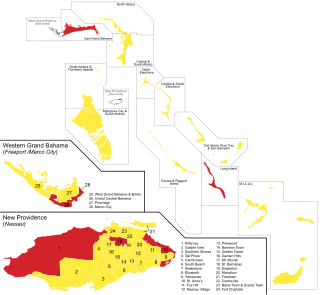
General elections were held in the Bahamas on 16 September 2021 to elect all 38 members of the House of Assembly.
Katherine Forbes-Smith is a Bahamian lawyer and politician and former President of the Senate of the Bahamas.
Sir Cecil Vincent Wallace Whitfield was a Bahamian politician who was a founding member and the first leader of the Free National Movement political party. He also served as a Minister in the cabinet of Lynden Pindling from 1967 to 1970 and as a longtime member of the Bahamian Parliament.
